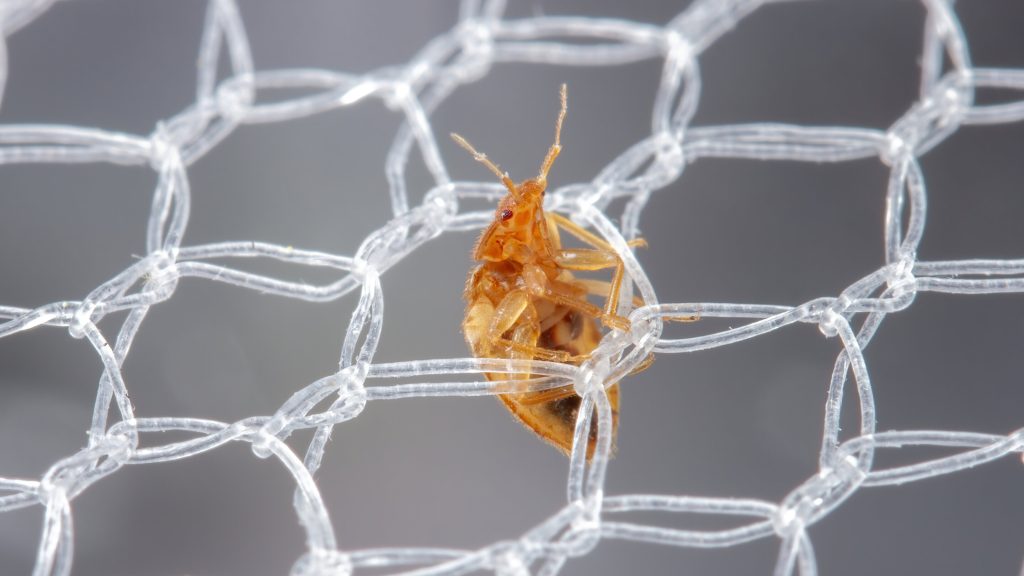A bedbug makes its way through a mosquito net. Photo by Matt Bertone, North Carolina State University.
For decades, insecticide-treated bed nets and indoor insecticide spraying programs have been the primary and widely effective control against mosquitoes that transmit the dangerous global disease malaria, but at one time these measures also controlled unwanted household pests such as bedbugs, cockroaches and flies.
Now, a new study from North Carolina State University reviewing the academic literature on indoor pest control finds that as household insects develop resistance to mosquito-targeting insecticides, those bedbugs, cockroaches and flies are coming back into homes, leading to community distrust, increased abandonment of these control methods and rising rates of malaria.
the work Appearance in Proceedings of the Royal Society B: Biological Sciences.
In other words, mosquito net Insecticide treatments that were highly effective in controlling pests Mosquito bites(and malaria) are increasingly being identified as causes of the resurgence of household pests.
“These insecticide-treated bed nets are not designed to kill household pests like bedbugs, but they worked really well,” said Chris Hayes, a doctoral student at North Carolina State University and co-corresponding author of a paper describing the study. “That’s what people really liked about them, but insecticides don’t work that effectively against household pests anymore.”
“Non-target effects are usually harmful, but in this case they were beneficial,” said Coby Schaal, the Blanton J. Whitmire Distinguished Professor of Entomology at North Carolina State University and co-corresponding author of the paper.
“The value to people is not necessarily in reducing malaria, but in killing other pests,” Hayes added. “There’s probably an association between the use of these bed nets and the spread of insecticide resistance in household pests, at least in Africa.”
The researchers add that other factors such as famine, war, urban-rural disparities and population movements may also be contributing to the rising incidence of malaria.
To prepare the review, Hayes combed through the academic literature, looking for studies on indoor pests like bedbugs, cockroaches, and fleas, as well as papers on malaria, mosquito nets, insecticides, and indoor pest control. This search yielded over 1,200 papers, which were then narrowed down through an exhaustive review process to a final set of 28 peer-reviewed papers that met the required criteria.
One study (a survey of 1,000 households in Botswana conducted in 2022) found that 58% were most concerned about mosquitoes in the home, while more than 40% were most concerned about cockroaches and flies.
Hayes said a recent paper published after the North Carolina State University study was completed showed people were blaming bed nets for bedbug infestations.
“The evidence is that if they can’t control the pests, people will stop using bed nets,” Hayes said.
But researchers say not all hope is lost.
“Ideally, there are two ways to go about this,” Schall says. “One is a two-pronged approach: mosquito control and urban quarantine. pest Control treatments targeting pests. The other is a new discovery. malariaControl tools that target these household pests at the same time. For example, the bottom of the mosquito net can be coated with a different chemical that targets cockroaches and flies. bed bugs.
“If bed nets had something to deter pests, they might be less criticized.”
For more information:
A review of the impact of indoor vector control on household pests: Good intentions challenged by harsh reality. Proceedings of the Royal Society B: Biological Sciences (2024). DOI: 10.1098/rspb.2024.0609. royalsocietypublishing.org/doi….1098/rspb.2024.0609
Provided by
North Carolina State University
Quote: Unintended consequences of success against malaria (July 23, 2024) Retrieved July 23, 2024 from https://phys.org/news/2024-07-unintended-consequences-success-malaria.html
This document is subject to copyright. It may not be reproduced without written permission, except for fair dealing for the purposes of personal study or research. The content is provided for informational purposes only.


